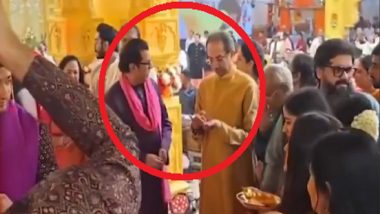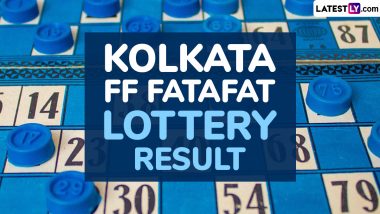New Delhi, March 24: Muslims in Mumbai, Delhi, and throughout India are observing the thirteenth Roza of Ramzan today, March 24, and are preparing for the fourteenth Roza on March 25. The holy month of Ramzan, also known as Ramadan, began on March 12 after the crescent moon was sighted on the evening of March 11. This sacred month is a time of fasting, prayer, reflection, charity, and humanitarian activities for Muslims worldwide, with fasting being one of the five pillars of Islam.
From dawn until dusk, Muslims abstain from food, drink, and other physical needs as an act of worship and obedience to Allah. The day starts with Sehri, a pre-dawn meal eaten before the Fajr (morning) prayer, and ends with Iftar, the evening meal that breaks the fast after sunset. Ramadan Explained: Why and How Do Muslims Fast? Are There Exemptions From Fasting? What Are Some Cultural and Social Traditions Associated With Ramadan?
As the fourteenth Roza approaches, Muslims in various Indian cities follow different Sehri and Iftar timings, based on their geographical location and celestial observations. In Mumbai, Delhi, Kolkata, Lucknow, and other major Indian cities, Muslim communities adhere to a schedule tailored to their local time zones. Ramadan Fasting Tips: From Staying Hydrated to Mindful Eating, Things That Can Help You With Fasting in the Holiest Islamic Month.
|
City |
Sehri |
Iftar |
|
Hyderabad |
05:03 AM |
06:29 PM |
|
Delhi |
04:59 AM |
06:36 PM |
|
Ahmadabad |
05:27 AM |
06:52 PM |
|
Lucknow |
04:46 AM |
06:21 PM |
|
Mumbai |
05:25 AM |
06:52 PM |
|
Pune |
05:24 AM |
06:47 PM |
|
Bengaluru |
05:09 AM |
06:32 PM |
|
Chennai |
04: 59 AM |
06:21 PM |
|
Kolkata |
04:20 AM |
05:50 PM |
|
Kanpur |
04:53 AM |
06:21 PM |
This meticulous approach ensures compliance with fasting requirements while accommodating regional differences. Moreover, Ramadan is not just about abstaining from physical indulgences; it’s also a period for spiritual growth and self-discipline. Muslims engage in increased prayers, recitation of the Quran, and acts of kindness throughout the month.
The collective spirit of unity and empathy during Ramadan strengthens community bonds and fosters compassion towards others. Looking ahead, the end of Ramadan will be marked by Eid al-Fitr, also known as Eid ul-Fitr, which is celebrated upon the sighting of the crescent moon, signaling the end of the fasting period. This joyous occasion is celebrated with prayers, feasting, and the exchange of gifts, symbolising gratitude, forgiveness, and a renewal of faith.
(The above story first appeared on LatestLY on Mar 24, 2024 04:00 PM IST. For more news and updates on politics, world, sports, entertainment and lifestyle, log on to our website latestly.com).













 Quickly
Quickly




















